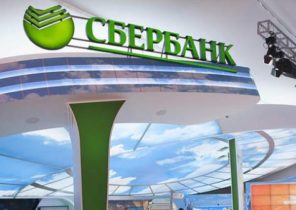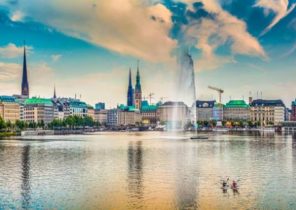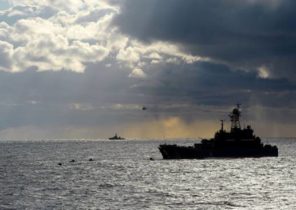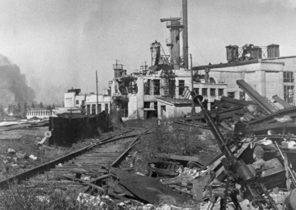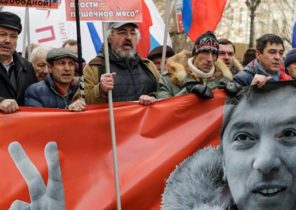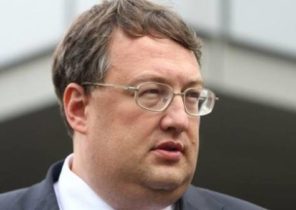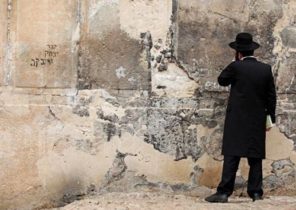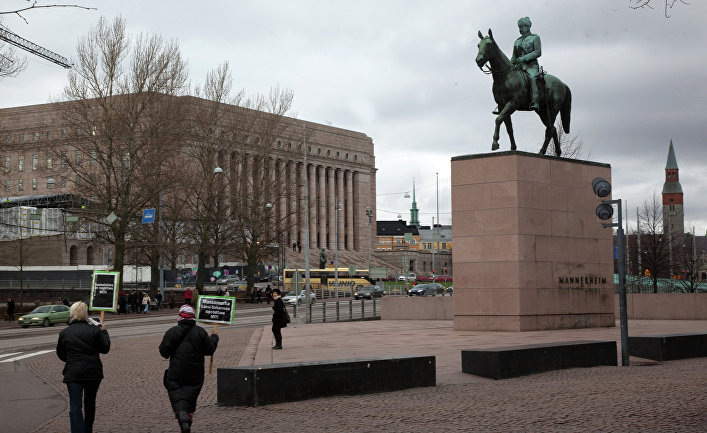
“My daughter, of course, was horrified when I told her that we are Russian. I think that it is not very much”, − laughing, tells Ilkka Ilmola (Ilkka Ilmola).
In Mikkeli, raw winter day. Everything in nature is highlighted in gray.
Dog Ilmola Touro just took a walk. Former man hunting for 14 years, and he’s deaf.
Lieutenant General Ilmola 76 years old, he is a General in the second generation. His father, Lieutenant-General Ilmola Paavo (Paavo Ilmola, 1911-1986) became the second person in the defence Forces of Finland. He retired as the chief of the General staff in 1971.
Ilmola just published the book “Ivan, head of the clothing store” (Ivan varusmestari, publisher Mediapinta). In it he tells the story of his great-grandfather Ivan Ivkov.
Ivkov (1840-1926) was a Russian by birth, the son of a Russian serf. Russian roots, it was a secret kind of Ilmola.
The ancestors of one of the knees kind of General Ilmola forgotten his real name, language and even religion.
About the Russian Ivkovi did not say, but the grandson was promoted to General, wanted to know the truth.
Ilmola sometimes asked parents about Ivkovi. In response, he heard something about the son of Tver Karelia, or the son of a Russian peddler. This is where it ended.
“It all started with a coincidence,” says Ilola.
In the 1990s, visiting Elmali was Russian Colonel-General of the land forces Vladimir Semenov. They went together to the plant in Kuusankoski, where he met with Ilmari Lindberg (Ilmari Lindberg), plant Manager, father of the current commander of the Finnish defence Forces Jarmo Lindberg (Jarmo Lindberg).
“Suddenly he asked if I said something Orthodox cemetery in the city of Hamina. I said no, but then added, he says. My ancestor buried there. He said he was once in the cemetery, but then it’s all over,” recalls Ilmola.
“Then I started thinking. The topic we had such a closed and secret, she never said anything”.
Tracked down Ivan, the head of the School of reserve officers (Reserviupseerikoulu) Pentti Airio (Pentti Airio), which Ilmola told about his ancestor, that was once in Hamina. Airio sent Ilmola excerpt from the memoirs of a former student of the Finnish cadet corps in Hamina.
Former cadet says that one day he was sent to the chief of the clothing store Ivkova, which has the nickname “Tschörnyj” (by analogy with “black” in Russian). Cadet describes Ivkov how do dark-haired, bearded Russian.
“The letter was dated 23 October 1998,” says Ilola.
“Only then it became really obvious that my ancestor − Russian. It was very exciting. The first wish was to know where he was born because my father didn’t say anything about the Russian.”
Ilmola writing a book about the life Ivkov in the form of the novel. Managed to know not all but quite a lot. Information Ilmola extracted together with her sister Maruchi Kangasmaki (Marjukka Kangasmäki).
“Sister appealed to the military archive. There were long rows of folders from the Finnish cadet corps. She pulled out three folders, and it so happened that in one of the folders was a track record and birth certificate of Ivan,” says Ilola.
“It is amazing that she even was able to read it. Documents are handwritten in Russian, and she taught Russian in the National University just a few years.”
Of birth certificate Ivkov became clear, and his place of birth in Russia.
“There is now a wilderness”.
Ivan Ivkov was born in 1840 in the Vologda province, in the village of ramen’e, located on the banks of the river Ohmy. Here at 23, he was taken to the Royal service. Military roads led him into the Grand Duchy of Finland.
The greater part of his life Ivkov served as the chief of the clothing store in the Finnish cadet corps in Hamina. From there he watched the birth of the Finnish identity, the attempts of Russification, civil war and the birth of independent Finland.
The most difficult moments of the life of Ivan connected with the civil war in Finland. Two of his grandchildren died in tragic circumstances: one was killed by red when you try to go on the side white, the other was red in Helsinki and was shot most likely by mistake.
“The period of the civil war was very bitter. I am in this respect a sensitive person, can not get pleasure from stories about tragic events. I wrote about this very neutral,” says Ilola.
Ivan served in the Finnish cadet corps by the chief of the clothing store when there was training a young cadet Carl Gustaf Mannerheim (Mannerheim, Carl Gustaf), who was later expelled from there.
In the genus Elmali, there is a legend that Ivan went notebook Mannerheim on the drawing after he left the Finnish cadet corps. Family tradition says that later the notebook was donated to the town Museum of Hamina.
Notebook Mannerheim is really in the town Museum of Hamina. The Museum staff was checked at the request of the newspaper Helsingin Sanomat, who gave this book as a gift. It turned out that, unfortunately, the documents of the Museum is not preserved information about the donor.
“A story to invent impossible”, − said Ilmola.
Ilmola says that there is not one photo of his ancestor Ivkov. But recently the story took an unexpected turn.
From the town Museum of Hamina has requested old photos of the cadet corps. Among them was a group photo, which was sealed by the employees of the service supply, artisans and forwarders cadet school and Junior officers.
On the back of the photo was a list of all imprinted on it. One name caught my eye: “Ifkoff”.
Appearance Itkoff quite fit the description that former cadet gave the chief of the clothing store Black. As a Junior officer, he sits in the front row. In accordance with the peculiarities of pronunciation, the name Ivkov transformed into Itkoff.
Ivan found.
In 1873 Ivan married. Ivan and Maria Ivkovic had four children: Alex, Dmitry, Olga and Nikolay. Born in 1881, Nicholas was the grandfather of Ilkka Ilmola. He began gradually to turn his family in Finnish.
Ilmola said that very well remembers his grandfather Nicholas, who was called “nick”.
“He was such a quiet, nice man. We had a summer house that belonged to the army, not far from Helsinki, near the island of Santahamina. I remember nick was lying on the rocks, and his hat was always pulled down over his eyes. And in a very clear summer days he used to take your hat off and say that’s probably going to rain soon”.
Nicholas worked as the head of the Telegraph office, and in Finland he was a COP.
“In my mind was that nick was trying to teach the father of the Russian language when he was admitted to the national defense University after the end of all wars. The stories, the father did not learn Russian and failed,” says Ilkka Ilmola.
“Other exams he passed so well that it is still enrolled”.
Nicholas was married with his Finnish-speaking Olga in 1905, even in the Orthodox rite. Six years later he moved from Orthodoxy to Lutheranism. In the same year he was born, his father Ilkka Ilmola.
Nicholas changed the name of the family on Ilmola after receipt of Finland’s independence in 1918.
“Nick was the first who changed his name. I don’t know why: if he was such a visionary?”
Ilkka Ilmola says that Nicholas was bilingual. Children the Russian language, he did not teach. At least, not taught Russian language Paavo’s father, Ilkka.
“Why nick knows Russian language, no one ever thought of that.”
Ilkka Ilmola can not say his father belonged to the Russian or the everything Russian.
“It seems to me that a Russian, he spoke the same as saying all Finns. He was not a fanatic, and was calm, balanced person.”
Ilmola says that he was very surprised when I saw the name of the father in the list of honored citizens of Finland − “Generals of independent Finland” (Itsenäisen Suomen kenraalikunta, publisher WSOY).
The last line was written: “who Gave the oath of the member of the academic Karelian society”.
“Most likely, the father is not very sympathetic to the Russians,” grins Ilmola.
“My sister didn’t believe me when I told her about it.”
Members of the Karelian academic society considered themselves defenders of Western culture before the threat from the East. The members of the society supported the idea of greater Finland and promoted Finnish language. Said that in the academic Karelian society “on can speak Russian, only clenching his teeth.”
In the Karelian academic society had four thousand members. It was disbanded in 1944 after the Soviet-Finnish war of 1941-1944.
In the Karelian academic society it was possible to enter only after a careful selection. Candidate members of the Society are specially trained and prepared for entry required the recommendation of two members of the society, which brought an oath. Members of the Society held a solemn pronouncing of vows.
After pronouncing the words of the oath of the members of the Society received a badge on which was the number of the vows. Badge number Paavo Ilmola not known. But it’s not uncommon, as in the surviving lists of members of the Society there are gaps.
The war against the Russian Paavo Ilmola left the village Ylamylly, from the edge of the scorched field, as in the famous novel by Vaino Linna “the Unknown soldier” (Väinö Linna, Tuntematon sotilas).
After two wars father Ilmola spent several months in prison on charges of concealing arms. Ilmola said that did not remember about it.
“Remember that neighbor major Hannila Toivo (Toivo Hannila) served time in prison for concealed weapons, and when he returned, we children gathered cranberries, so he could eat porridge with berries”.
The interrogation Paavo Ilmola long stored in the attic.
“At some point, he probably destroyed because we haven’t seen them since”.
Russian Paavo Ilmola had to communicate via many years after the war. “Father was in the Soviet Union in the early 1960s, when Finland for the first time bought a large amount of military equipment,” − says Ilola.
“Father says that the Russian always suspected that he knows Russian language. But he really didn’t know.”
Ilmola indicates on the kitchen shelf: “From that trip in memory remain only the teapot”.
Ilmola regrets that he did not speak Russian, although at the national defense University language teaching.
“I learned a lot about the Russian when he wrote his book. I believe that those who talk about how the Russians are buying land and moving here, have to remember that some of us came here before.”
Turo led into the house. The dog turns and barks.
Together with Touro Ilmola wandered in the dense forests of Lapland. Then had to write two books about hunting.
Turo — this is the second dog Ilmola. The first gave him a good one Cap (Köpi), former chief of the defence Force Hagglund Gustav (Gustav Hägglund).
Ilmola says that while writing his books began to wonder what kind of people are Russian. He became interested in the classics of Russian literature with whom I was not acquainted.
In the corner of the bedroom in the house Ilmola hangs an icon. He admits that the old faith of his family, Orthodoxy, spoke in it. In the family there is a legend that Ivan had the icons, which he allegedly gave the Orthodox Church in Hamina.
Ilmola traveled to Russia many times as a military and as a tourist. He laid a wreath at the tomb of the Unknown soldier near the Kremlin walls.
“I remember well that I left thinking how all this happened. But it was good to visit”.
